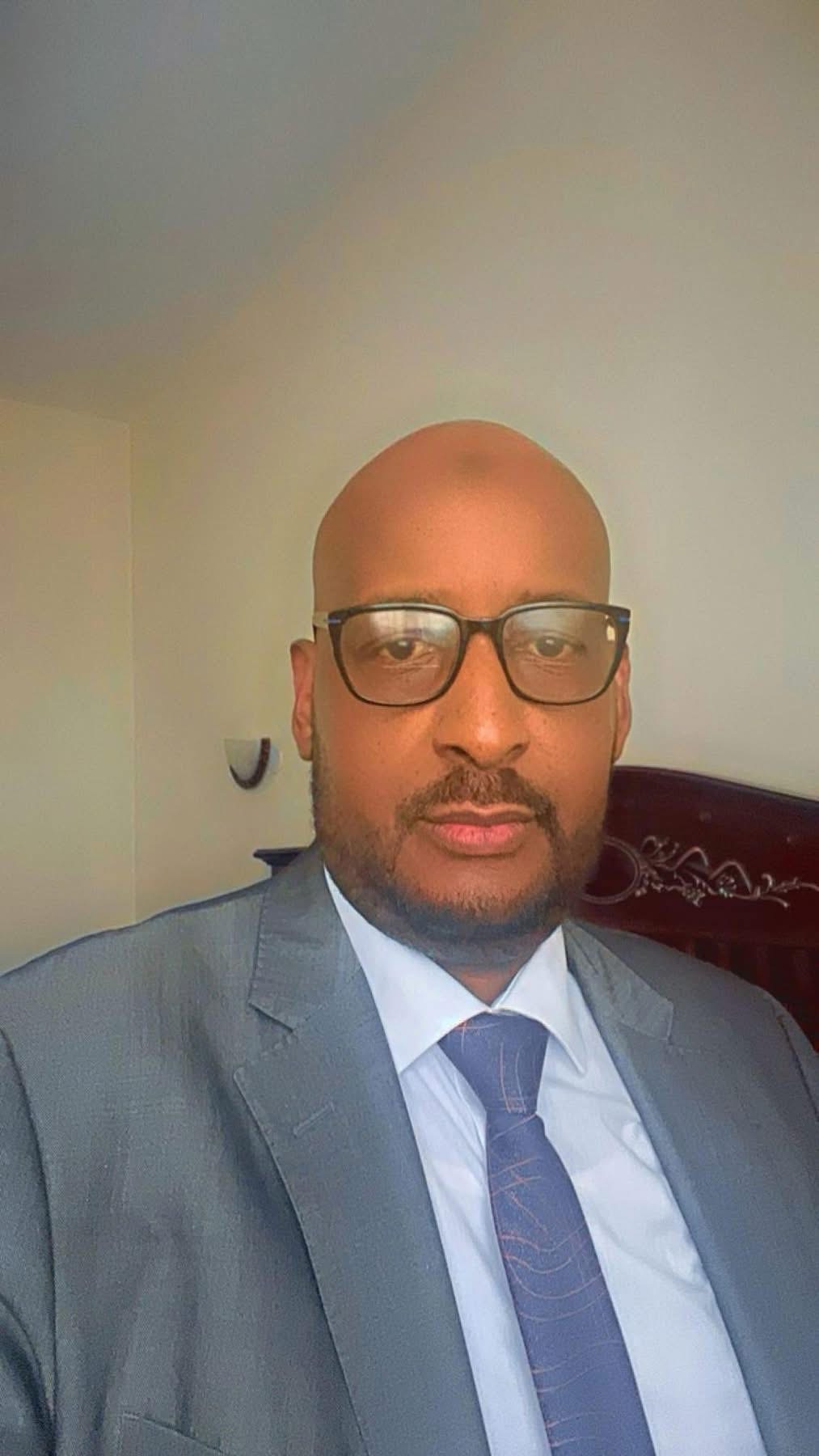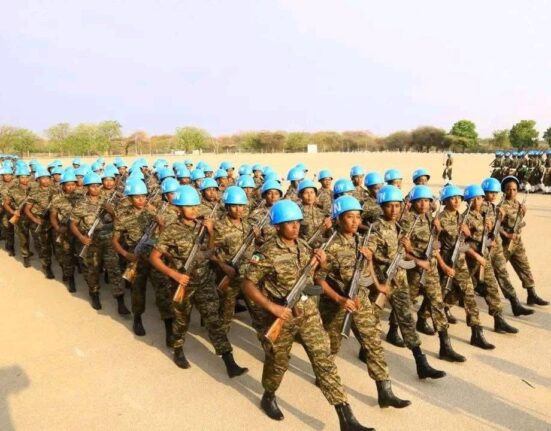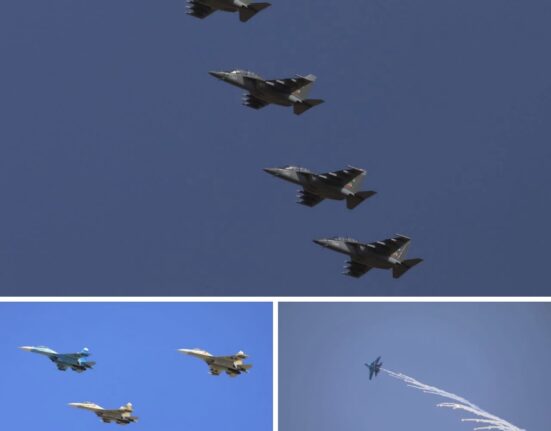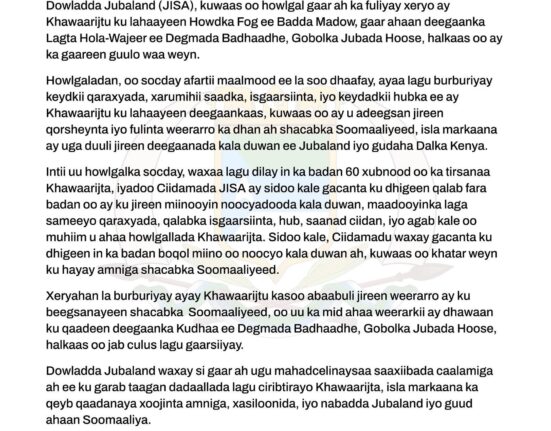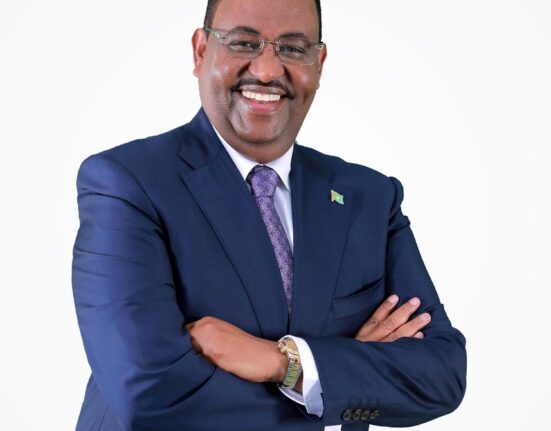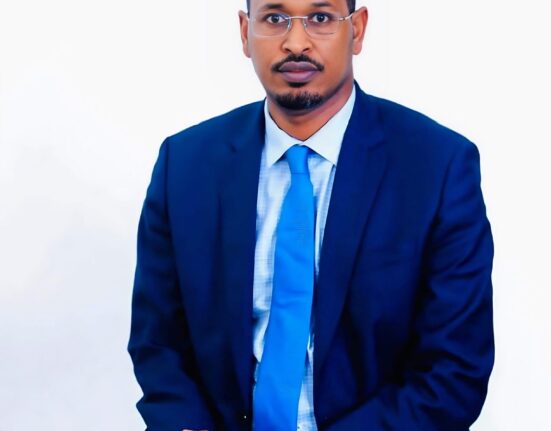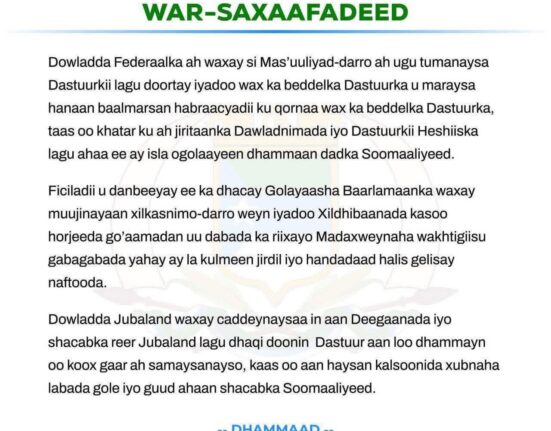Mohamud A. Ahmed – Cagaweyne
The Horn of Africa is a theatre where the currents of water, the lines of blood, and the smoke of conflict intertwine to define the survival of nations. In this arena, President Hassan Sheikh Mohamud of Somalia shuttles between capitals that are foes to one another, moving with a posture that can only be described as the Diplomacy of Facelessness. His movements suggest neither clarity nor conviction, but a desperate balancing act where the goal is not to build trust, but to escape wrath. Yet such a stance renders Somalia neither a trusted ally nor a credible partner. Instead, it leaves Mogadishu in the uncomfortable position of being used when convenient, discarded when interests shift.
Ethiopia’s Monument of Dignity
Ethiopia’s Grand Ethiopian Renaissance Dam (GERD) is more than a hydroelectric project. It is a monumental declaration of dignity, a sovereign correction of history, a recalibration of centuries-old injustice where foreign treaties denied Ethiopia its rightful share of the Nile. In constructing the GERD, Ethiopia has done what few African nations have dared—transform ambition into architecture, and sovereignty into steel. This is not a pilot project but a continental lighthouse. It illuminates Ethiopia’s resilience and dares Africa to believe that its resources can be harnessed for its own people rather than for external dictates.
Ethiopia has paid dearly for this dream. Its economy has been strained, its diplomatic relations tested, and its people have sacrificed their blood in conflicts that, directly or indirectly, are tied to its assertion of sovereignty. To build the GERD is to bear not only the weight of concrete but also the weight of defiance against centuries of Nile geopolitics. It is Ethiopia’s blood, not Egypt’s, that irrigates the soil of Horn politics. It is Ethiopia’s persistence that holds back the tide of chaos from sweeping across the region.
Egypt’s Conditional Support
Egypt, by contrast, has played its role largely through the prism of the GERD. For Cairo, the Nile is existential; it is life itself. Ninety-seven percent of its water comes from that river. To Egyptians, the GERD represents a hand on their throat, even when Ethiopia promises careful filling and fair distribution. Thus, Cairo has lobbied fiercely, mobilizing the Arab League, courting allies, and offering Somalia diplomatic cover, military training, and economic aid. Yet this support is situational. It is tethered not to Somalia’s survival but to Egypt’s survival. If Somalia is useful as a voice in Arab forums or as a symbolic gesture in Cairo’s quarrel with Addis Ababa, then support flows. If not, it diminishes. It is solidarity of circumstance, not solidarity of sacrifice.
Ethiopia’s Blood in Somalia’s Soil
Beyond dams and treaties lies a truth often unspoken: Ethiopia has sacrificed blood for Somalia’s stability. Its soldiers have crossed borders, not for ceremonial politics but to fight Al-Shabaab, the existential threat gnawing at the very pillars of Somalia’s federal government. Ethiopian lives have been lost in Beledweyne, Baidoa, Mogadishu, and countless unnamed villages. These sacrifices are not symbolic gestures. They are acts of blood and fire that have preserved the fragile federal order Hassan Sheikh presides over. Without Ethiopian boots and sacrifices, the arithmetic of Somalia’s security would collapse. Egypt has given words in councils and funds in narrow streams, but Ethiopia has given lives in the battlefield. Between the two, there is no equivalence.
The Faceless Shuttle
Yet Hassan Sheikh moves between Cairo and Addis with the diplomacy of facelessness. In Addis, he attends the inauguration of the GERD, offering his presence as if it signals solidarity. In Cairo, he whispers reassurance that Somalia remains part of the Arab brotherhood. This oscillation is not strategy but survival. It is a gamble that by avoiding firm alignment, Somalia can avoid wrath. But in truth, faceless diplomacy wins no enduring trust. Egypt will use Somalia for as long as it amplifies its voice in the GERD dispute. Ethiopia will tolerate Somalia’s ambiguity, but it will never forget that while it bleeds in Somali soil, Mogadishu hesitates to acknowledge the depth of that sacrifice.
Credibility in Geopolitical Equations
Diplomacy is mathematics. Credibility is the constant that gives the equation meaning. When words in one capital contradict gestures in another, the constant collapses. Somalia risks being perceived as a variable without value, a nation that adds nothing reliable to the equations of its neighbors. Egypt calculates Somalia’s worth through the lens of GERD; Ethiopia calculates Somalia’s worth through the lens of security. If both perceive Mogadishu as playing a double game, the result will be a subtraction of support on both sides.
Ethiopia’s Pride and Pain
Ethiopia has earned the right to stand tall. The GERD is not only a dam but a defiance of dependency, a redefinition of sovereignty, a testament that Africa can dream at scale. Yet pride is matched by pain. The Ethiopian state is stretched by internal conflicts, inflation, and diplomatic resistance. Egypt has not ceased its campaign; external powers weigh in; climate change threatens Nile flows. But even in its turbulence, Ethiopia remains the indispensable actor of the Horn, the state without which no regional security equation can stand. Somalia’s survival is entangled with Ethiopia’s strength. The GERD is not Somalia’s battle, but the blood Ethiopia sheds against Al-Shabaab is Somalia’s survival.
A Policy Recalibration for Mogadishu
Somalia’s leadership must rise beyond the comfort of ambiguity and recalibrate its foreign policy with sober realism. Egypt may remain a valuable partner in specific diplomatic theatres, especially in the Arab League and at the United Nations. Yet its support is episodic, bound tightly to the GERD question, and unlikely to outlast the heat of that dispute. Ethiopia, by contrast, is a constant. Its proximity, its intertwined security interests, its blood spilled on Somali soil, and its vision of regional integration make it the cornerstone of Somalia’s external relations. Mogadishu must embrace this reality with clarity and conviction. To treat Egypt and Ethiopia as equals in weight is to confuse arithmetic with illusion. The ledger of history shows Ethiopia has invested more deeply in Somalia’s survival than Cairo ever has or ever will. Policy must reflect that truth.
For Somalia to secure its future, it must craft a doctrine that recognizes Ethiopia not merely as a neighbor but as a guarantor of stability. This does not mean surrendering sovereignty or becoming subordinate, but acknowledging the scale of sacrifice and the gravity of dependence. Ethiopia is not infallible, and its internal challenges may complicate its reliability. Yet to discount its role is to discount Somalia’s own lifeline. A balanced policy is possible, but balance must not mean blindness. Mogadishu must learn to say clearly: Egypt’s friendship is welcome, but Ethiopia’s partnership is indispensable.
Conclusion: Between Blood and Water
Hassan Sheikh’s shuttle diplomacy may buy him temporary reprieve from anger in Cairo or suspicion in Addis. But in the long calculus of geopolitics, facelessness is erosion, not protection. Egypt’s support is bound to the GERD, conditional and circumstantial. Ethiopia’s weight, however, is carved in blood, in electricity, in soil, in sacrifice. Somalia cannot afford to treat both as equal. Ethiopia deserves greater recognition in Somali policy, not only for building Africa’s largest dam but for bleeding to keep Mogadishu standing.
Between blood and water, the scales of gratitude must be clear. To Ethiopia, Somalia owes acknowledgment of sacrifices that cannot be measured merely in words. To Egypt, Somalia may extend diplomatic courtesy. But to Ethiopia, Somalia must extend recognition, respect, and partnership. Anything less is not only ingratitude but strategic blindness.
Mohamud A. Ahmed – Cagaweyne
Columnist, Security and Political Analyst, and Researcher
Greenlight Advisors Group – Somali Region of Ethiopia +251900644648


